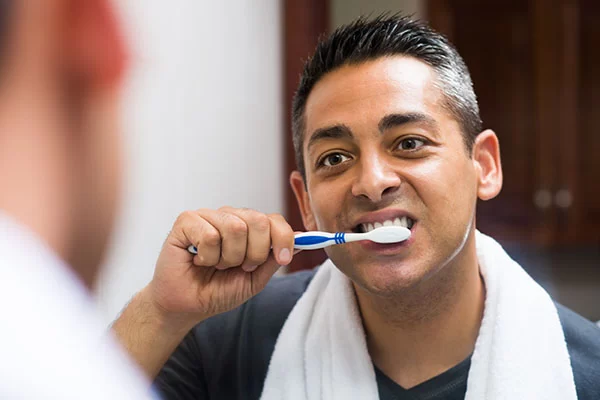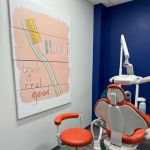
Professional Teeth Cleaning for Sensitive Teeth: How to Safely Care for Your Smile
- Why Sensitive Teeth Need Special Attention
- The Benefits of Professional Teeth Cleaning
- How to Manage Sensitive Teeth During a Cleaning
- When Should You Get a Professional Cleaning?
- What Are Your Options for Professional Teeth Cleaning?
Why Sensitive Teeth Need Special Attention
If you've ever experienced sharp, uncomfortable sensations when eating cold or hot foods, you might suffer from sensitive teeth. Sensitivity occurs when the enamel protecting your teeth wears down, exposing the underlying layer of dentin. For people with sensitive teeth, regular dental cleanings are crucial, but they need to be approached with care.
Professional teeth cleaning for sensitive teeth should focus on techniques that minimize discomfort. The right approach can help remove plaque and tartar buildup without exacerbating tooth sensitivity.
The Benefits of Professional Teeth Cleaning
Professional dental cleanings are essential for everyone, but they are especially important for people with sensitive teeth. These cleanings go beyond what you can do with a toothbrush and floss. They help to:
- Remove stubborn plaque and tartar buildup that could worsen tooth sensitivity
- Prevent gum disease, which can contribute to sensitivity
- Give you a thorough inspection of your oral health
- Improve the appearance of your teeth by removing stains
Regular cleanings at the dentist not only improve your overall dental health but can significantly reduce sensitivity by keeping your gums healthy and your enamel intact.
How to Manage Sensitive Teeth During a Cleaning
One of the main concerns for those with sensitive teeth is how a professional cleaning might feel. Fortunately, modern dentistry techniques allow for gentle care even for the most sensitive teeth. Here are some tips on managing sensitivity during a cleaning:
- Communicate with your dentist: Let your dentist know about your sensitivity beforehand. This ensures they can adjust their approach.
- Use of desensitizing toothpaste: Ask if your dentist can apply a desensitizing treatment or recommend a special toothpaste for before and after your cleaning.
- Gentler instruments: Some practices now use ultrasonic cleaning tools that are less likely to irritate sensitive teeth.
These methods ensure that you can maintain your oral health without adding to your discomfort.
When Should You Get a Professional Cleaning?
If you're experiencing tooth sensitivity, it's a good time to book an appointment with your dentist. Regular cleanings are recommended every six months, but if you're noticing increased sensitivity or discomfort, it may be worth visiting your dentist sooner. Additionally, if you haven't had a professional cleaning in a while, your sensitivity could worsen due to plaque or tartar buildup.
Don't wait for pain to strike—regular cleanings can keep your sensitivity at bay and prevent further issues from developing.
What Are Your Options for Professional Teeth Cleaning?
There are various options for professional teeth cleaning, including traditional manual cleaning, ultrasonic scaling, and more. Here's a quick look at what each entails:
- Manual cleaning: A hygienist uses small hand-held instruments to remove plaque and tartar. This method is often gentler for sensitive teeth.
- Ultrasonic cleaning: This method uses vibrations and a stream of water to remove plaque and tartar more efficiently, and is typically gentler on sensitive teeth.
- Air polishing: A combination of air, water, and powder helps remove stains and plaque without direct contact with your teeth.
Your dentist will help you choose the best option based on your level of sensitivity and oral health needs.
For more information on professional teeth cleaning services and to schedule an appointment, visit Dentistry Toothtruth.







 Palm Valley Orthodontics5.0 (3 review)
Palm Valley Orthodontics5.0 (3 review) Shine Dental Associates4.0 (488 review)
Shine Dental Associates4.0 (488 review) Dr. David R. Vasquez, DDS5.0 (3 review)
Dr. David R. Vasquez, DDS5.0 (3 review) Amit Vora, DDS4.0 (13 review)
Amit Vora, DDS4.0 (13 review) Flanders Pediatric Dentistry4.0 (210 review)
Flanders Pediatric Dentistry4.0 (210 review) Morrone, Kaye and Yucha Orthodontics - Moorestown5.0 (387 review)
Morrone, Kaye and Yucha Orthodontics - Moorestown5.0 (387 review) The Importance of Oral Health Education During Pregnancy for a Healthy Pregnancy
The Importance of Oral Health Education During Pregnancy for a Healthy Pregnancy Best Tips for Brushing Your Teeth Properly for Healthy Gums: Essential Techniques for Oral Health
Best Tips for Brushing Your Teeth Properly for Healthy Gums: Essential Techniques for Oral Health Why Skipping Dental Checkups Can Lead to Bigger Oral Health Problems
Why Skipping Dental Checkups Can Lead to Bigger Oral Health Problems Advantages of Porcelain Dental Restorations
Advantages of Porcelain Dental Restorations How Can Diabetes Cause Tooth and Gum Problems? Preventing and Managing Oral Health Issues
How Can Diabetes Cause Tooth and Gum Problems? Preventing and Managing Oral Health Issues Healthy Habits for Promoting Good Oral Health and Hygiene: Tips for a Healthy Smile
Healthy Habits for Promoting Good Oral Health and Hygiene: Tips for a Healthy Smile